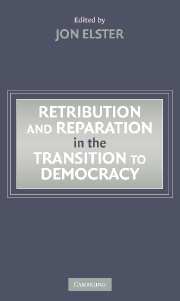Book contents
- Frontmatter
- Contents
- Contributors
- Preface and Acknowledgments
- 1 Introduction
- PART I GENERAL ISSUES
- PART II GERMANY AND GERMAN-OCCUPIED COUNTRIES AFTER 1945
- PART III LATIN AMERICA, POST COMMUNISM, AND SOUTH AFRICA
- 9 Paranoids May Be Persecuted: Post-totalitarian Transitional Justice
- 10 Transitional Justice in Argentina and Chile: A Never-Ending Story?
- 11 Transitional Justice in the German Democratic Republic and in Unified Germany
- 12 Rough Justice: Rectification in Post-authoritarian and Post-totalitarian Regimes
- 13 Truth and Reconciliation Commission in South Africa Amnesty: The Price of Peace
- 14 Conclusion
- Index
10 - Transitional Justice in Argentina and Chile: A Never-Ending Story?
from PART III - LATIN AMERICA, POST COMMUNISM, AND SOUTH AFRICA
Published online by Cambridge University Press: 03 December 2009
- Frontmatter
- Contents
- Contributors
- Preface and Acknowledgments
- 1 Introduction
- PART I GENERAL ISSUES
- PART II GERMANY AND GERMAN-OCCUPIED COUNTRIES AFTER 1945
- PART III LATIN AMERICA, POST COMMUNISM, AND SOUTH AFRICA
- 9 Paranoids May Be Persecuted: Post-totalitarian Transitional Justice
- 10 Transitional Justice in Argentina and Chile: A Never-Ending Story?
- 11 Transitional Justice in the German Democratic Republic and in Unified Germany
- 12 Rough Justice: Rectification in Post-authoritarian and Post-totalitarian Regimes
- 13 Truth and Reconciliation Commission in South Africa Amnesty: The Price of Peace
- 14 Conclusion
- Index
Summary
INTRODUCTION: TRANSITIONAL JUSTICE AND THE POLITICAL DILEMMAS OF DEMOCRATIC TRANSITIONS
For years we have inquired whether constitutional rulers can punish past human rights violators who still are the armed “guardians” of the country, or whether impunity is the price for democratic stability. When do democracies risk their stability: when they punish or when they pardon human rights violators? In transitions from a repressive authoritarian regime to a democratic one, the dilemma about how to place the guardians under democratic rule becomes more acute: will the guardians accept being punished for the crimes they committed while in government without revolting against the newborn regime? On the other hand, can democracy survive without demonstrating that all citizens are equal before the law? The ethical foundations of democratic rule establish that all criminals should be brought to justice, particularly if they were part of an authoritarian strategy and the crimes were massive. Nevertheless, covering up crimes against humanity has been a generalized practice to achieve democratic stability, particularly in those cases in which past criminals have had relevant political functions in the transition to democracy. Therefore, where do we stand? What do recent and present experiences teach us about the relationship between the treatment of past human rights violations and its effects on the legitimacy and stability of emerging democratic regimes?
The similarities and differences between the Argentine and Chilean cases make them particularly suited for a comparative approach to these questions.
- Type
- Chapter
- Information
- Retribution and Reparation in the Transition to Democracy , pp. 206 - 238Publisher: Cambridge University PressPrint publication year: 2006
- 10
- Cited by



